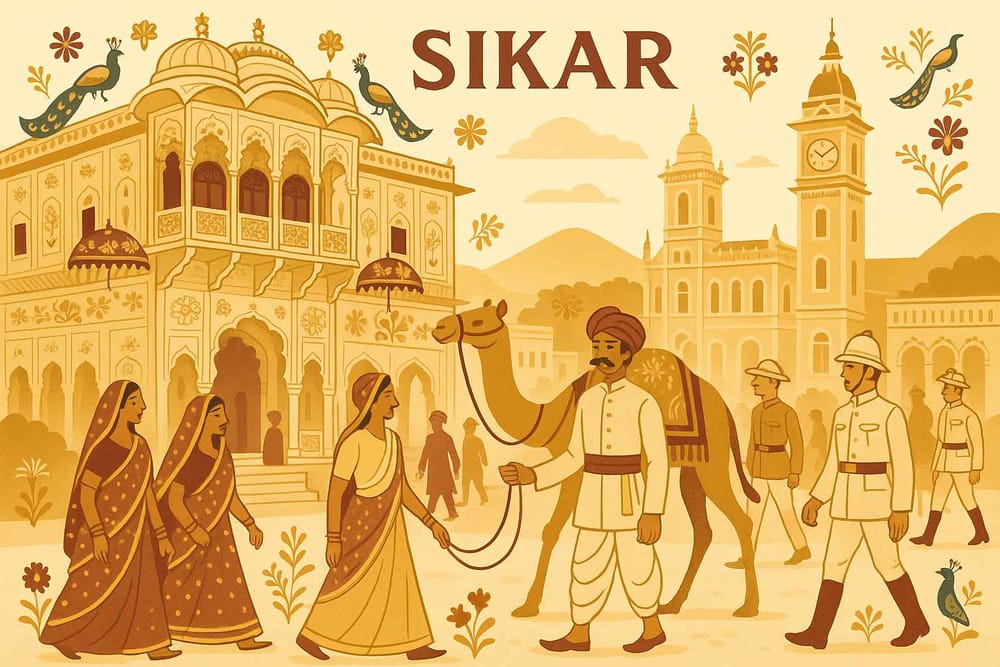
British Era Influence on Sikar- A Historical Perspective
Walk through the bustling lanes of Sikar, and you'll feel history whispering from every corner. The magnificent havelis, with their intricate frescoes, tell tales of prosperous Marwari merchants. The formidable forts stand as silent witnesses to the valour of Rajput rulers. It’s a story we all know and love. But there’s another chapter, one that’s often spoken of in hushed tones—the time of the British Raj. It was a period that didn’t just pass by; it seeped into the very soil of this land, bringing changes that forever altered the course of Sikar's destiny. This isn't just a history lesson; it's a journey to understand how tradition and modernity began their intricate dance in the heart of Rajasthan.
When Two Worlds Met: The British Footprint in Rajasthan
To understand what happened in Sikar, we have to look at the bigger picture of Rajasthan during the British Raj. The British were masters of a unique kind of control. They didn't rule princely states like Sikar directly. Instead, they formed treaties, creating a system of indirect governance. Sikar, a proud part of the Shekhawati region, found itself navigating this new reality. British officers became a presence, influencing decisions on everything from trade to law, all while the local Thakurs officially remained in power. It was a delicate balance, where our rulers maintained their dignity, but had to align their policies with British interests.
A New Way of Doing Things: Governance and Administration
The British influence brought a wave of administrative reforms that trickled down into the daily lives of the people. The age-old systems of collecting land tax, which were based on trust and tradition, were slowly replaced with more structured, document-based revenue systems. This changed land ownership patterns and how people related to the land their ancestors had farmed for generations.
Local courts started incorporating British legal principles, which was a huge shift from the traditional panchayat-style dispute resolution. For the local rulers, the Thakurs, this era brought a complex change in their role. Their power was still visible, but their autonomy was clipped. They were now answerable to a colonial administration, a reality that naturally led to friction and quiet acts of resistance from local leaders and common folk who felt their traditions were being undermined.
Paving the Path to Modernity: Infrastructure and Economy
One of the most visible legacies of this period was the development of infrastructure. The arrival of the railway was nothing short of a revolution for Sikar. Thanks to the forward-thinking Rao Raja Madho Singh Bahadur, who maintained a good relationship with the British, the dream of connecting Jaipur to Sikar by rail became a reality. Suddenly, this Rajasthani town was linked to the major trade hubs of India. This iron horse didn't just carry goods; it carried ideas, opportunities, and a new pace of life.
This period also saw the first electric lights flicker on in Sikar and the construction of proper roads. These advancements were transformative, making travel easier and boosting the local economy. Sikar’s traders could now expand their businesses far beyond the regional boundaries, integrating the town into the larger colonial economy. Of course, this economic growth came at a price, as the new systems often favoured British trade interests. The rich heritage of local craftsmanship, something deeply explored in Mewar's traditional arts, also felt the impact of these new economic currents.
A Fusion of Styles: Architecture and Education
The British era left an unmistakable mark on Sikar's skyline. While the city proudly retained its traditional Rajasthani architecture, you can see colonial-style buildings and design elements blending in. Structures like the 'Victoria Diamond Jubilee Hall', built by Rao Raja Madho Singh Bahadur, stand as examples of this architectural fusion. This blend created a unique visual identity for Sikar, where Rajputana grandeur met colonial elegance.
This era also ushered in a new approach to education. The British established schools that introduced Western educational methods. While traditional learning continued, these new institutions helped increase literacy rates and opened up new worlds of knowledge for the people of Sikar, shaping a new generation of thinkers and leaders.
The Enduring Legacy in Sikar Today
The British era was a period of profound transition for Sikar. It shaped the city's modern infrastructure, governance, and educational landscape. While the cultural core of Sikar remained deeply Rajasthani, the influence of the West was woven into its fabric, creating a unique and resilient identity. This history reminds us of Sikar's ability to adapt and evolve, a spirit that is beautifully reflected in the living traditions of Rajasthan, much like those you can read about in the royal history of Udaipur.
Just as it's important to understand the layers of Sikar's history, preserving our broader cultural and spiritual heritage is a duty we all share. These stories of change, resilience, and tradition are what make our culture so rich.
About Bhaktilipi: Our Commitment to Heritage
At Bhaktilipi.in, we are deeply passionate about preserving and sharing the timeless devotional literature and stories that form the bedrock of our culture. We believe that by digitizing these precious texts, we can ensure they continue to inspire generations to come, safeguarding traditions that might otherwise fade away.
We don’t just archive these stories; we reimagine them for today's world, making them accessible and meaningful for your spiritual journey. If you find inspiration in understanding our history, like the British influence on Sikar, you'll find a universe of wisdom and devotion waiting for you on our platform.
Stay connected with us for more such historical insights and devotional content.
- Follow us on Social Media: Join our communities on Facebook and Instagram for daily inspiration, stories, and updates that bring our rich heritage to your fingertips.
- Subscribe to Our YouTube Channel: Immerse yourself in our world of devotional content, from beautifully narrated stories to insightful discussions. Find us on YouTube and become part of our growing family.
A passionate group of people dedicated to preserving India's knowledge of Dharma, Karma, and Bhakti for ourselves and the world 🙏.
